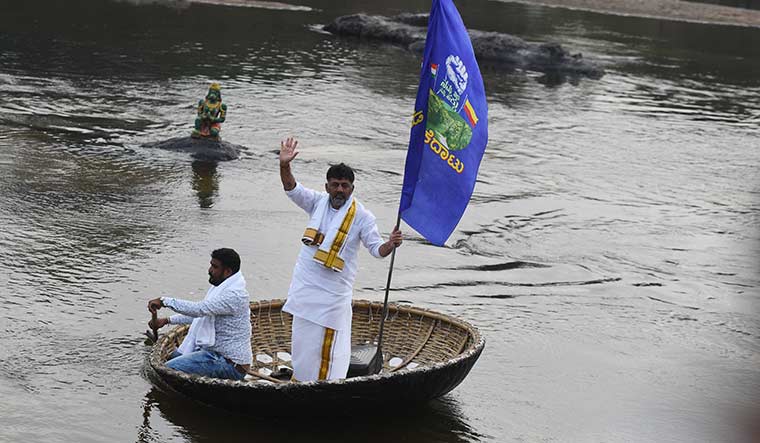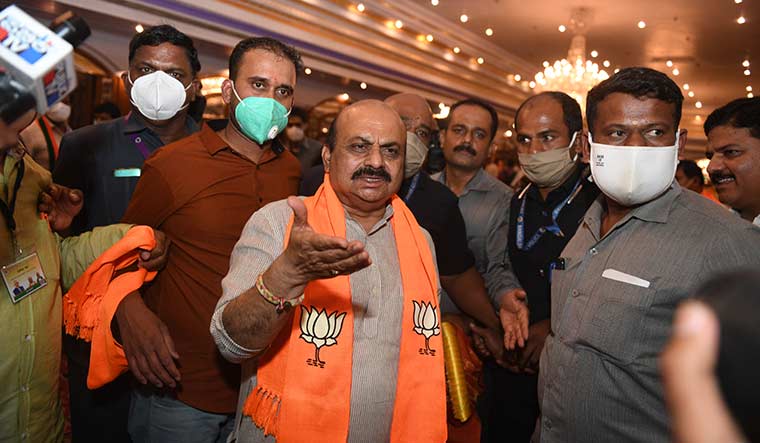When Karnataka Congress president D.K. Shivakumar, legislative party leader Siddaramaiah and the leader of the opposition in the Rajya Sabha Mallikarjun Kharge beat the nagari (drum) on the banks of the Cauvery at Sangam on January 9, it was a wake-up call for the party cadres. The leaders kicked off a 155km padayatra from Sangam to Bengaluru, demanding speedy implementation of the Mekedatu balancing reservoir project in Kanakapura.
It was also a warning bell to the ruling BJP, and the Janata Dal (Secular), the third major party in the state, as it looked like the beginning of a revival of the Congress in the Old Mysuru region, the Vokkaliga heartland. The BJP and the JD(S) fear that the rally would galvanise the support of the politically significant Vokkaligas, the second largest caste in the state, for the Congress.
A padayatra in 2010 from Ballari to Bengaluru by Siddaramaiah, challenging a “corrupt” BJP government, had catapulted him to the chief minister’s chair in 2013. Shivakumar was hoping to tackle his opponents within the party and outside it with the ‘Namma neeru namma hakku (Our water is our right)’ padayatra. However, on the fifth day of the 11-day march, the party was forced to call it off as the Karnataka High Court rapped the government and the Congress over the massive rallies being held amid the pandemic. “We respect the sentiment of the people and the High Court and the opinion of our legislators. We believe we have a commitment towards the people and as a party that has made many sacrifices for the country, we have decided to sacrifice this rally, too, for the time being. But we will not stop the rally. We will resume it from Ramanagara once it is conducive,” said Shivakumar.
The waters of Sangam, the confluence of the Cauvery and the Arkavathi, have been making political ripples in the state. Interestingly, it has also brought the Old Mysuru region into the spotlight as the new battleground for the next assembly elections, a departure from the state’s Lingayat-centric politics in the past few decades. The region is likely to decide if the BJP or the Congress crosses the majority mark, or the JD(S), once again, becomes the kingmaker.
JD(S) patriarch H.D. Deve Gowda seems to have sensed it, as the party has announced a state-wide campaign for the completion of the pending irrigation projects in the state. “A padayatra is not good enough,” said H.D. Kumaraswamy, JD(S) chief and Gowda’s son. “Like my father, the Congress should fight long legal battles to ensure justice for Karnataka.”
The JD(S), which draws its political strength from the Vokkaligas, has been in a crisis, with the Congress under Shivakumar trying to reclaim its support base in the community and the BJP looking beyond its Lingayat vote bank. In the 2018 election, the JD(S) won 29 of its 37 seats in the Old Mysuru region, which has 59 Assembly constituencies spread across the districts of Chamarajanagar, Mysuru, Mandya, Hassan, Ramanagara, Tumakuru, Chikkaballapur, Kolar and Bengaluru Rural. But many senior leaders have left the party citing neglect and ‘family-centric’ politics. Recently, Gowda’s grandson Suraj Revanna became the eighth member of the family to enter electoral politics by winning an MLC seat. Gowda’s defeat in the Tumkur Lok Sabha constituency in 2019 indicated the winds of change sweeping through the Vokkaliga belt, and that the community was willing to look beyond the family. The Congress gave them an option by selecting Shivakumar, a Vokkaliga, to lead the party.
The BJP is also playing the same game, hoping to clear the majority mark in the next election. It made C.N. Ashwath Narayan deputy chief minister in the B.S. Yediyurappa government and C.T. Ravi national general secretary (both are Vokkaligas) as part of its experiment of grooming new leadership and taking its support base beyond Lingayats.
The Mekedatu project, which has been a bone of contention between Karnataka and Tamil Nadu, has suddenly become a flash point for the political parties in Karnataka. The Congress and the BJP are blaming each other for the delay in the implementation of the project that can provide drinking water to a third of Bengaluru and generate 400 MW power. The project is being favoured by farmers in the Old Mysuru region as well, as the new reservoirs will ease the burden on the four existing reservoirs.
The BJP called the padayatra a “political gimmick” and said the Congress did nothing to expedite the Mekadatu project when it ruled from 2013 to 2018. “The Congress wasted five years and it took them four years to prepare a detailed project report. We got the stay imposed by National Green Tribunal Chennai vacated on June 17, 2021. But the matter is still before the Supreme Court. After [former chief minister] B.S. Yediyurappa, I have been following up with central water ministry for the environmental clearance,” said Chief Minister Basavaraj Bommai.
Former water resources minister M.B. Patil, however, said there had been no delay by the Congress government. “On October 25, 2014, we called for a global expression of interest to prepare a detailed project report. After the single bidder, WAPCOS, quoted 022.07 crore, we called fresh bids and EI Technologies bagged it on February 25, 2016. The detailed project report (DPR) was given in-principle approval by the state government on March 13, 2017, and was submitted to the Central Water Commission in June 2017.
“But we were asked to revise the DPR as per the new CWC guidelines. We modified the DPR after the Supreme Court allocated an additional 14.75 tmc of water to Karnataka in February 2018. The revised DPR and pre-feasibility reports were submitted to CWC in August 2018. But since the Mekedatu project got exempted from pre-feasibility report clause as it had no irrigation component, we had to revise the DPR. It was submitted in January 2019, when Shivakumar was the water resources minister.”
Siddaramaiah said the BJP government was not keen on the project because the party wanted to expand its base in Tamil Nadu. “Tamil Nadu BJP chief K. Annamalai is protesting the project. BJP national general secretary C.T. Ravi is favouring Tamil Nadu,” he said. “The project will take care of the drinking water needs of Bengaluru for the next 50 years.”
The final order of the Cauvery Water Disputes Tribunal in 2007 had failed to bring a closure to issues such as the division of surplus water. Tamil Nadu objected to Karnataka’s move to construct two balancing reservoirs at Mekedatu to harness the surplus water in good monsoon years and moved Supreme Court saying the construction of the two reservoirs would impound the flow into the intermediate catchment at Biligundlu, thus reducing the flow to the mettur dam. Karnataka’s contention is that releasing the monthly water quotas to Tamil Nadu is difficult in distress monsoon years, and the dam can help store surplus water in normal years and ensure the monthly quota every year. Also, there is no irrigation plan under the Mekedatu project.
Mekedatu, which means ‘goat’s leap’ in Kannada, is a narrow gorge on the Cauvery. Whether the padayatra can provide a giant leap to the Congress and Shivakumar remains to be seen.



